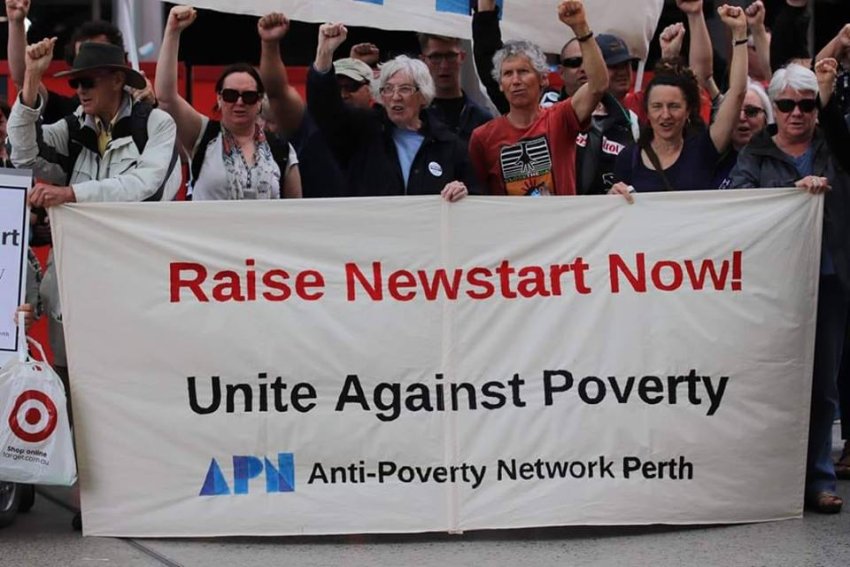
All of us know someone who is worse off than ourselves. Chances are that person is someone barely surviving on the Newstart Allowance.
Currently $278 a week for a single unemployed worker, the allowance has been effectively frozen since 1994.
Grassroots organising by the Australian Unemployed Workers Union (AUWU) and various anti-poverty organisations, including the Australian Council of Social Service (ACOSS), has presented a convincing case for change.
Supporters of the need to raise the rate include: The Australian Institute (from the left) and the Institute of Public Affairs (from the right), the Australian Medical Association, the Country Women's Association, Reserve Bank governor Philip Lowe, Business Council of Australia chief executive Jennifer Westacott and former Liberal prime minister John Howard.
This broad range of support has put the federal Coalition government on the back foot.
It is within this context that the government has proposed to drug test social security recipients, extend cashless welfare cards and defend the continued issuing of robodebts, despite evidence that unemployed workers are less likely to use illegal drugs, that debit cards keep people in poverty and that the robodebts are arbitrary and inhumane.
As well as being stigmatising, expensive and inefficient, the government's punitive approach to welfare provision turns attention away from the job shedding impact of privatisation, neoliberal globalisation and the decimation of local manufacturing.
It is as if we are supposed to believe that in a society that just a few decades ago had full employment, a million or more workers suddenly got lazy.
Keeping Newstart low dovetails with the government's attempt to use anti-union laws to restrict workers organising and maintain downward pressure on wages.
Low wages have contributed to higher national extremes of wealth inequality and, according to some economists, exacerbated the economic slowdown.
Raising the rate of Newstart could help to stimulate the slowing economy, create 12,000 jobs and help avoid a recession.
Australia needs a serious discussion about poverty, unemployment and inequality. Despite signing up to United Nations goals to reduce poverty by half by 2030, we are nowhere near meeting those goals — despite claims of 29 years of uninterrupted economic growth.
The lived experiences of unemployed workers reveal that policing the unemployed through the current compliance regime causes unnecessary stress and hardship — which is unsurprising as it seems it was designed to just that.
The Raise the Rate campaign has given a much needed voice to the unemployed and exposed many of the myths behind the government's rhetoric about unemployed workers.
According to the AUWU:
* more than 16 jobseekers apply for each vacancy;
* the average length of time on Newstart is three years (not the few months the government would have us believe);
* working for the dole and having to apply for at least 20 jobs a month, regardless of qualifications or experience, makes it harder for unemployed workers to job hunt and creates an expense for employers who receive these applications;
* payments can be suspended or cancelled by private job agencies for minor reporting infractions or due to mistakes by Centrelink; and
* workers who are chronically ill, disabled or just worn out due to a lifetime of hard work, are forced onto Newstart instead of receiving medically related benefits
Given that the poverty line for single people is $433 a week, raising Newstart by $75 a week, along with rent assistance, should be just the start.
As a society we need to reimagine our economy and question the necessity of achieving a budget surplus, come what may. A budget surplus often comes at the cost of education, healthcare and welfare. In the present environment, it raises the risk of recession.
It is a positive development that Anti-Poverty Week, which was held over October 13-19, focused on Raise the Rate.
An inclusive movement of empowered unemployed workers needs to be at the centre of approaches to tackling unemployment and creating real solutions to poverty based on solidarity, not charity.
[Steve O'Brien is a Community and Public Sector Union delegate to Hunter Workers, one of the sponsors of Hunter Anti-Poverty Week, and a member of the Socialist Alliance. An earlier version of this article appeared in the Newcastle Herald.]